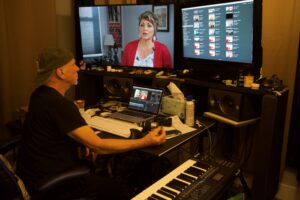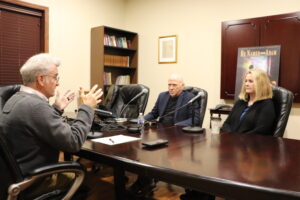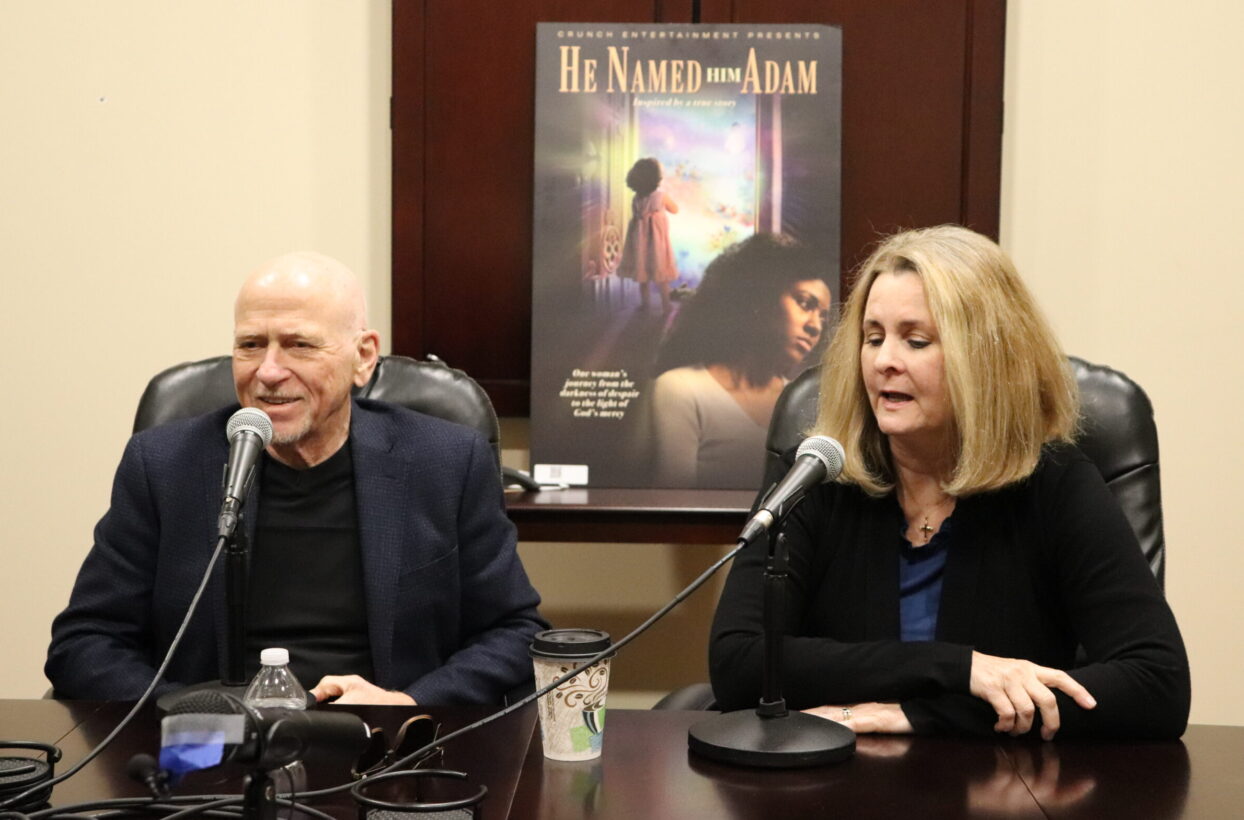Catholic filmmakers in East Tennessee begin funding for pro-life film
By Gabrielle Nolan
Marc Aramian and Veronica DiPippo of Crunch Entertainment have spent a lifetime cultivating their artistic talents in the realms of theater, composing, and filmmaking.
The husband-and-wife duo are known in the Diocese of Knoxville for their recent film about Father Patrick Ryan, titled Father Ryan: A Higher Call. The docudrama was featured on the Eternal World Television Network (EWTN) and will soon be available for streaming on the FORMED Network.
Their latest project, a pro-life film, is one they consider to be a worthy cause.
Mr. Aramian and Ms. DiPippo have begun funding for He Named Him Adam, a film depicting the true story of Regina Block, a woman whose healing from abortion occurred after her young daughter had dreams of her aborted brother in heaven.
“[Regina] suffered from crippling depression for nine years, leading her to the brink of suicide, and one day as she was driving by the abortion clinic, she became so distracted that she almost ran into an oncoming truck,” Ms. DiPippo shared. “What saved her was the voice of her 4-year-old daughter in the back seat, and what her daughter said changed her life forever. That was, and I quote, ‘Mommy, I had a dream about my brother.’”
The young girl had not been told that her mother had previously been pregnant and had an abortion, but “she had been having a series of recurring dreams about meeting an 8-year-old brother in heaven,” Ms. DiPippo said.
The dreams turned Ms. Block’s life around.
“She sought out post-abortive counseling for the first time in nearly a decade. She volunteered at a pregnancy resource center, where she helped other women who were experiencing unexpected pregnancies. She is now the director for the National Memorial for the Unborn in Chattanooga,” Ms. DiPippo said.
The National Memorial for the Unborn is a place where “people come to regret abortions, can basically pay tribute and honor to their unborn children, and come and grieve and acknowledge their dignity and their existence,” Ms. DiPippo explained.
The film is being crowdfunded through the Christian organization GiveSendGo.
“For those people that don’t know, crowdfunding is an Internet portal that allows people who are interested in supporting something to donate a small amount of money,” Mr. Aramian explained. “Normally, movies are made for millions of dollars and people invest half a million apiece, you know, a bunch of people get together and do that. This is more grassroots, people donating anywhere from $5 to $5,000.”
Besides donating online, supporters may give donations via personal check or through Venmo, a mobile payment service.
“I like to say that if we could find 50,000 pro-lifers who would give us $10 [each]… we could fund the filming of this movie,” Ms. DiPippo said.
Crowdfunding is expected to take around six months, and then pre-production can begin. Production of the film will likely last one to two years.
“We are talking to some key crew members right now,” Ms. DiPippo said. “There hasn’t been any initiation of casting at this time, and there won’t be until we actually get closer to when we’re going to be shooting. It’s basically just now waiting for the funding to be able to move forward with pre-production.”

Marc Aramian tends to the technical details in producing a documentary for Tennessee Right to Life. (Photo courtesy of Marc Aramian / Veronica DiPippo)
Their creative roles have Mr. Aramian as the producer, composer, and sound designer, and Ms. DiPippo as the writer and director.
“I like to call it a movie and a ministry because that’s really what it is,” Ms. DiPippo said. “That’s how we look at this, because we think it can have a spiritually transformative impact on individuals and all our culture.”
The team plans to shoot the film within the Chattanooga area.
While it is a family film for all ages, there is a scene in the script where Ms. Block’s abortion is depicted.
“It’s not done in a graphic way,” Ms. DiPippo said. “That would be the only scene I think that would be something that a parent would need to look at and decide how much preparation they would need to do before they showed somebody, let’s say, under the age of 13.”
“If we can save one life, if we can be the catalyst for one conversion, this would be well worth it. It would be just so worth it,” Ms. DiPippo said. “I hope people will think that way about it, in other words, that they’re participating in something that has the potential to save lives and also to lift women out of the negative impact of abortion. Because it really does, it inspires women to show them the path. This is a movie and a mission, so we want to make this as available to people as possible.”
Mr. Aramian and Ms. DiPippo first learned of Ms. Block’s story at the Chattanooga March for Life two years ago, where Ms. Block gave a speech before the march.
“She told this story, and we just fell in love with it,” Mr. Aramian said. “I mean, it was so inspiring to so many people there, and Veronica said, ‘you know, someday I want to make a movie about that.’”
“I just felt that her story impacted me,” Ms. DiPippo said. “Even though I was raised in a Catholic household and my parents made it very clear that we were a pro-life household, I bought into the culture. So, when my friends came to me and said, ‘I’m pregnant, what do I do? Please help me,’ and ‘I’ve already made the appointment for the abortion,’ I never tried to talk them out of it, and in some cases I even drove them to the clinic and waited. I never thought beyond that. I never thought about the bigger picture, even though I have no excuse because I should have, because I was raised to.”
Ms. DiPippo said her heart changed over the decades as she began to hear stories of post-abortive women who suffered greatly and dealt with grief, depression, anxiety, difficulty sleeping, and drinking or eating too much.
“Things you would associate with post-traumatic stress disorder, which mirrors a lot of the symptoms of post-abortive stress disorder,” she said. “And when I started hearing these stories and then ultimately these women regretted what they had done… I thought, well wait a minute, that’s not what was sold to us, that’s not what was marketed to us through the media, through Hollywood, through our world. What was marketed to us is that… a woman goes and has an abortion, walks out, goes on with her life, and never looks back. That really started to weigh upon my heart, and I realized that there was a lot more to the story, and this had a transformative effect on me. I became pro-life as a result.”
“I thought [Regina’s] particular story really encapsulated a lot of these other stories that I had heard, and I thought that the resolution of it, especially the power of the dream having a transformative effect, was a powerful story to be told. And I thought it was an important one to be told now,” Ms. DiPippo said.
The couple has been speaking to pro-life groups, such as Knights of Columbus councils, and has been endorsed by Tennessee Right to Life.
“If there are any pro-life groups who would like us to come and speak, be willing to host some sort of fundraiser for us, anything would be appreciative. We’ve been very blessed,” Ms. DiPippo shared.
‘Discovering the Catholic Church’
When the couple married outside of the Church in 2006, Ms. DiPippo described herself as a “nominal Catholic” and Mr. Aramian as a non-Catholic.
“I had been going to Protestant churches for years, many years,” he said. “I was actually baptized in the Armenian Apostolic Church. I was born in Chicago, and then my family moved to Arizona, where there were no Armenian churches, so the only option was Protestantism. Anyway, I did the prodigal son thing and became what I thought was an atheist, and then I came back.”
About 10 years ago, Mr. Aramian read the entirety of the Catechism of the Catholic Church.
“There was almost nothing in there that a Protestant could disagree with, and the reasoning was so sound and so solid in the Catholic Catechism that I began to realize that there was more of a connection between the faiths than a lot of people realize,” he said. “At that time, I was praying for the churches to come together, that there would be one church reunited under Christ.”
“Then a couple years passed… and I found also that the sacraments, that there was a power in that, there was a power in the Catholic prayers that I didn’t think existed quite the same way in the Protestant churches,” Mr. Aramian continued. “I read the Catechism again, and then after I finished it that time I realized, yeah, I’m going to go ahead. I think I’m just going to go into RCIA; I’m probably going to be a Catholic.”
Ms. DiPippo said she “did not put any pressure on him at all to join the Catholic Church.”
“My faith journey… was leading me back toward Christ, and I had gone in every direction you can imagine,” she said. “First of all, I had moved away from the Church, completely abandoned the Church, and then started exploring all kinds of other things, dabbled in all kinds of other religions and various sects. But of course, I came from an academic household, my father was a philosophy professor, my mother was a professor and was always challenged to look at the original sources. … So, then when I went down this road and came back to the Church, I realized the importance of the sacraments… and I recognized that this Church is unique in that it offers the tools, all the tools for salvation, for individual salvation, and I wanted to be a part of that.
“I recommitted myself to my Catholic faith, and as this journey was happening, my husband was on his own journey and was discovering the Catholic Church,” Ms. DiPippo continued. “So, you could have knocked me over with a feather one day when he came to me and said, ‘I’m going to RCIA.’ … That was a big surprise, I had no idea.”
Before the couple left Los Angeles to move to Chattanooga in May 2021, Mr. Aramian was received into the Church, and the couple was married in the Church.
“I was confirmed the day before during the rehearsal,” Mr. Aramian recounted. “I did the confirmation, then we did the rehearsal, came back the next day and got married, and then the next day moved to Chattanooga.”
Creative journeys
Although the couple now resides in the Chattanooga area, their creative journeys have brought them around the country and around the world.
Ms. DiPippo began her career as an actress, living in New York City for seven years. After completing a theater apprenticeship, she was challenged by one of her acting teachers to write a play.
“To my great surprise, the play ended up getting produced,” she said. “After that, I started writing more plays, and I veered away from acting and into the direction of writing and directing. And I had a few dozen of my plays and one-acts produced in New York City, including a children’s musical, which ran off-off-Broadway for three and a half years. At one point I had three things running at the same time in New York. I had a one-act, a children’s musical, and a full-length play, and I still was having to piece things together—teach and temp and do all kinds of side jobs, and I was killing myself. I thought, I’m just running around in circles, let me go to Los Angeles.”
Ms. DiPippo had several friends who moved to Los Angeles and worked in the movie industry.
“I’d kind of avoided doing that for a long time because my heart was really in theater, and in many ways it still is. But it’s very difficult to make a living in theater, so I moved to Los Angeles, and I started working in a lot of different capacities. I was a story reader, which is basically a script reader or analyst for production companies, including a famous actor/director. And then I worked in production offices, and I just started working my way up the chain all over again and ended up getting an agent and started working. I did scripts for independents and for some studios as well.”
Wanting to be more familiar with the production side of things, Ms. DiPippo joined an independent filmmaking organization, where she performed several different crew positions.

Veronica DiPippo and Marc Aramian research the Father Patrick Ryan story in downtown Chattanooga that their film company, Crunch Entertainment, made into a film for the Basilica of Sts. Peter and Paul. (Photo courtesy of Marc Aramian / Veronica DiPippo)
It was in this organization, in 2002, where she met her husband.
Mr. Aramian received an engineering degree but pursued furniture-making. During the time of owning a custom furniture company, he met and befriended a retired composer/conductor who came out of retirement to assist a community musical that Mr. Aramian was participating in.
“We became really good friends,” he said. “He was going to teach me how to read music, and I kept cheating because I have a really good ear, so he made me write music. After a couple of months he said, ‘you know you’re going to be a composer someday.’ Well I thought he was blowing smoke, but it turns out that he was right. And then a few years after apprenticing with him, I branched out now away from the furniture thing and became a composer.”
Mr. Aramian’s musical career took him to Saudi Arabia, Japan, the Philippines, and England.
“Eventually, I wanted to get back to Los Angeles to be a feature film scorer,” he said. “Then when I got to LA. … I knew I had to get to know young writer/directors and so on. So, I went to the same organization [Veronica] was in, and that’s where we met. Shortly after that, she wanted to shoot another short film; I said, ‘well, I’ll produce it for you.’ And I did that, and I just fell in love with producing. So, shortly after that we formed a production company, and then we spent all those years in LA trying to get feature films off the ground and various things, one after another we were stymied in our efforts.”
One situation in particular that led to the couple leaving Los Angeles was when Ms. DiPippo was “canceled” by Hollywood.
At the same time that the couple’s film Dandelion Dharma was doing extremely well and winning awards, Ms. DiPippo was invited to be a contributing writer for Breitbart News.
“I had a couple of my articles come out on Breitbart.com that ended up being, I guess you could say going viral,” Ms. DiPippo explained. “As the award nominations were coming in and my film was being picked up and mentioned and screened, you would think that there would be a momentum forward. Instead, I was actually being dropped. … Meetings with producers were getting canceled, (I was) dropped by my agent. It’s because I wrote a couple of articles.”
One article was titled “How Hollywood Taught Me Not to Behave.”
“It’s an article about growing up in a household with a Republican mother and a Democrat father and how what it meant was everybody was welcome at our house, everyone was welcome at our table as long as you were respectful,” Ms. DiPippo shared.
“I grew up in a household where any race, creed, color, denomination, political persuasion was welcome, but it was based on respect. This article was essentially about how the culture was shifting, so that there was no respect anymore. You couldn’t meet and break bread, and it was these enemy camps that were forming. I thought that was not a good thing, and I was seeing this particularly coming from those who claim to be progressive, who claim to be the most tolerant were actually the least tolerant. And as it turned out, I was proven correct,” she added.
“I wouldn’t consider myself a major player in Hollywood, but I was known. People knew who I was, and they had read my work; my work was respected; I was hired, employed,” Ms. DiPippo continued. “Essentially, I guess you could say I was blacklisted. But not in any kind of public or spectacular way as more notable people were, but definitely I would say that I was canceled. I was probably one of the earlier people to be canceled. And when that happens to you, you say well, that was interesting, and you look around and you just move on in another direction. But you don’t let them stop you. You don’t let them defeat you. You don’t let them silence you.”

“Veronica and Marc’s story of working against the grain in Hollywood and then finding a new home as Catholic filmmakers in East Tennessee is compelling. It needed to be told in different ways, both in print and by hearing their own voices.” — Jim Wogan, host Inside the Diocese of Knoxville podcast (photo Gabrielle Nolan)
Regrouping
Ms. DiPippo said that leaving California “was a big regrouping” for them both.
Once they became parishioners of the Basilica of Sts. Peter and Paul in Chattanooga, they met and had lunch with Father David Carter. It was during this encounter that the couple received the opportunity to create the film based on Father Patrick Ryan’s life story.
“After we made this film, we thought, wow, maybe we should keep this momentum going,” Ms. DiPippo shared. “And then this story (about Regina) just came to us, it just fell in our lap. So, we had both looked at each other and said, OK, we need to do this. … The Lord is pushing us in this direction to make this story now.”
Mr. Aramian discussed the importance of creating pro-life films.
“The culture war that we’ve been fighting for decades is really brought about by Hollywood making movies that have made people comfortable with edgy things, like abortion for example,” Mr. Aramian said. “The only way that we can really counter that is to also make movies. It may seem ridiculous that I say that, but stories that have an emotional impact are far more powerful than thinktanks or talking about the science and the logic.”
Mr. Aramian spoke about the millions of women who have had abortions and call themselves Christian but “have not yet reconciled with Christ what they’ve done.”
“They are going to continue to vote for abortion, uphold it, say it’s OK to their children and their grandchildren,” he said. “So, Regina’s story is really an emotional, uplifting, inspiring story about reconciliation with Christ, and that we think will have an impact and change hearts of these women that really haven’t faced this. … People don’t admit that they’ve had an abortion or that they’re suffering because of it. But it’s really much more common than people realize, so we think that by telling Regina’s story we can change the hearts which will change the minds and lead us back to a culture that respects life.”
For more information or to donate to the film, visit henamedhimadam.com.
Listen to Mr. Aramian and Ms. DiPippo on the Inside the Diocese of Knoxville podcast here.

